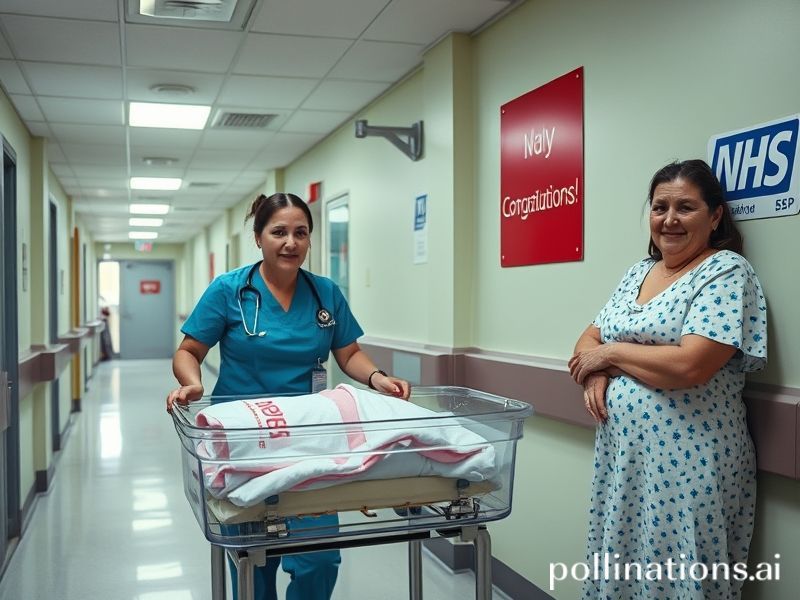NHS Maternity Wards: The World’s Most Exhausted Welcome Wagon
By the time the rest of the planet had finished arguing about whether babies should be delivered by TikTok-influenced doulas or by drones with midwifery certificates, the United Kingdom quietly reminded everyone that it still runs the grandest, crankiest, and most overstretched maternity apparatus in the Western world: the NHS maternity hospital network. Imagine a Victorian railway terminus, staffed by saints in scrubs, where every arrival is both miracle and bureaucratic event, and you begin to grasp the scene.
To visiting obstetricians from Berlin or Singapore, a British labour ward resembles a National Trust property crossed with a Formula-1 pit stop. There are heritage tiles, creaking pipes, and a tannoy that crackles like Churchill is still in charge, while simultaneously the staff perform manoeuvres on bleeding mothers with the speed of a Le Mans tyre change. The global takeaway is simple: if you want to see stoicism engineered into concrete, come to the NHS at 3 a.m. when the epidural cart has gone AWOL and the backup generator is humming a funeral hymn.
Globally, maternity units have become geopolitical barometers. In Sweden, they’re minimalist IKEA showrooms with mood lighting and a doula named Björn who offers lingonberry aromatherapy. In rural China, entire counties share one ambulance and a midwife who doubles as the local Party secretary. In the United States, birth is a luxury subscription service—platinum tier includes a lactation consultant who once appeared on Oprah. Against this backdrop, Britain’s offering is a defiantly public, charmingly frayed institution where the greatest innovation is still a cup of tea delivered with the gravity of a state secret.
Numbers, because misery loves company: England alone welcomes roughly 600,000 new citizens annually through 138 consultant-led units, many of which were designed when “ultrasound” sounded like a Cold-War espionage gadget. International benchmarks rate UK perinatal safety better than the global average, but the staff vacancy rate hovers around 12%, which means the average midwife’s to-do list is longer than the Magna Carta. Compare this to Japan, where robots hand out towels, or Rwanda, where drone blood drops arrive faster than an Uber Eats pizza. The lesson: progress wears many costumes, but exhaustion looks the same in any language.
The ripple effects are deliciously ironic. Every German hospital CFO secretly dreams of the NHS’s budgetary discipline—£2.6 billion a year for maternity, or roughly the cost of three Bundesliga transfers. Meanwhile, Silicon Valley venture capitalists circle like seagulls above chips, convinced that a “disruptive” app will fix childbirth the way it fixed hailing taxis. Their pitch decks never mention the part where the app crashes when the amniotic fluid hits the fan.
Security hawks see maternity wards as soft targets; diplomats see them as soft power. When the Duchess of Cambridge emerges immaculate from the Lindo Wing, the world’s press broadcasts an image of British healthcare that is 10% reality, 90% fairy dust. The NHS quietly cashes the reputational cheque, while the actual Lindo Wing—technically private—functions like a VIP lounge for monarchy and supermodels. Elsewhere, the global South watches the spectacle and mutters: if only colonialism had come with a post-natal massage voucher.
And yet, for all the sarcasm, the system endures. Cuban doctors on exchange programs return home wide-eyed at the sheer throughput. Australian midwives arrive on gap years and leave converted to the Church of Universal Queuing. Somewhere in Sierra Leone, a public-health minister keeps a faded poster of a British midwife holding a newborn under emergency lighting, captioned: “We too could be this tired.”
Conclusion? The NHS maternity hospital is less a building than a planetary punchline: proof that a nation which once ruled waves now struggles to rule its own staffing rotas, yet still manages to deliver the future on time—give or take an apology over the tannoy. The world watches, half-horrified, half-admiring, and books its next holiday to London just in case junior decides to arrive early. Because if you’re going to be born anywhere, you might as well do it somewhere that apologises when the pain relief is late. Cheers, and welcome to the queue.







